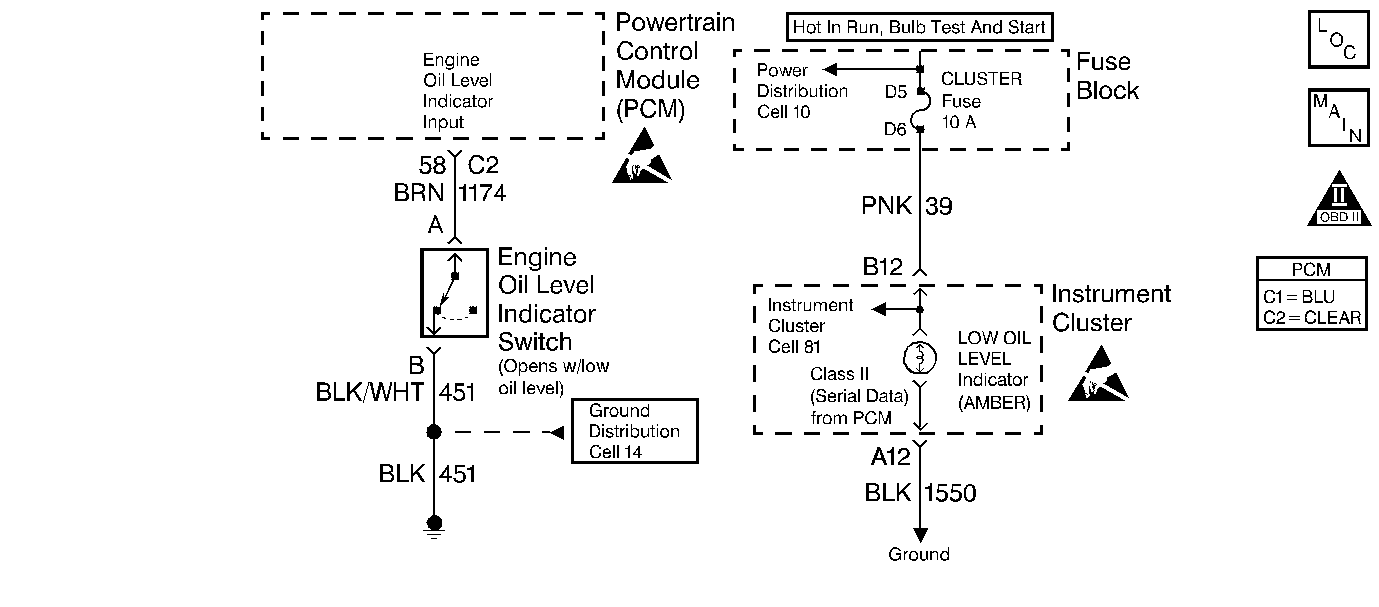
Circuit Description
The oil level switch is a magnetic reed float style switch which is closed with oil level full and open when oil level is low. The PCM monitors the oil level switch to determine if the oil is LOW or OK. When the Test Conditions have been met the PCM will monitor the oil level switch input. If a low oil level is indicated the PCM will send a serial data message to the Instrument Cluster(IP). The IP will then indicate the oil level is low. If the Test Conditions have not been met then the PCM ignores the oil level switch input and oil level OK is indicated to the IP. The engine coolant temperature Test Condition is required to ensure enough time has passed since the engine was last stopped. The time period/coolant temperature difference is to allow enough time for the engine oil to drain back into the oil pan. The colder the current engine temperature is, the larger the drop in temperature necessary. This is to ensure colder, thicker oil has drained back into the oil pan.
Test Conditions
| • | DTCs P0117, P0118 or not set. |
| • | Engine speed is 0 RPM. |
| • | The current engine coolant temperature is from 5°C to 20°C less than the temperature stored in memory when the engine was last running. |
Important: The oil level switch is mounted to the oil pan at a level below the full level. Removal of the switch may drain several quarts of oil.
Test Description
-
The Powertrain OBD System Check must be performed before proceeding with this diagnosis. Go to any DTCs that are set first.
-
With the engine speed at or above 2300 RPM the engine oil switch should indicate LOW oil level. The engine oil is scavenged to a level that is below the switch during higher engine speed and also during some lateral vehicle movement conditions.
Step | Action | Value(s) | Yes | No |
|---|---|---|---|---|
1 | Was the Powertrain On Board Diagnostic (OBD) System Check performed? | -- | Go to A Powertrain On Board Diagnostic (OBD) System Check | |
2 |
Fill or drain the engine oil if required. Does the display indicate the oil level is OK? | -- | ||
3 |
Does the engine oil level display indicate LOW while engine speed is at the specified value? | 2300 RPM | Fault not present. Refer to Diagnostic Aids | |
4 |
Does the engine oil level display indicate the oil level is OK? | -- | ||
5 | Place the jumper between terminal A and a known good engine ground. Does the display indicate the engine oil is OK? | -- | ||
6 |
Is the resistance the same or less than the value specified? | 5ohms | ||
7 |
Does the engine oil level display indicate the oil level is LOW? | -- | ||
8 |
Is the resistance the same or more than the value specified? | 10Kohms | ||
9 | Repair the open in the engine oil level input circuit. Is the repair complete? | -- | Go to Powertrain Control Module Diagnosis | -- |
10 | Repair the open in the engine oil level switch ground circuit. Is the repair complete? | -- | Go to Powertrain Control Module Diagnosis | -- |
11 | Repair the short to ground in the engine oil level switch input circuit. Is the repair complete? | -- | Go to Powertrain Control Module Diagnosis | -- |
12 |
Was the terminal contact repaired? | -- | Go to Powertrain Control Module Diagnosis | |
13 | Replace the engine oil level switch. Is the replacement complete? | -- | Go to Powertrain Control Module Diagnosis | -- |
14 |
Was terminal contact repaired? | -- | Go to Powertrain Control Module Diagnosis | |
15 | Replace the Powertrain Control Module. Refer to PCM Replacement/Programming . Is the replacement complete? | -- | Go to Powertrain Control Module Diagnosis | -- |
